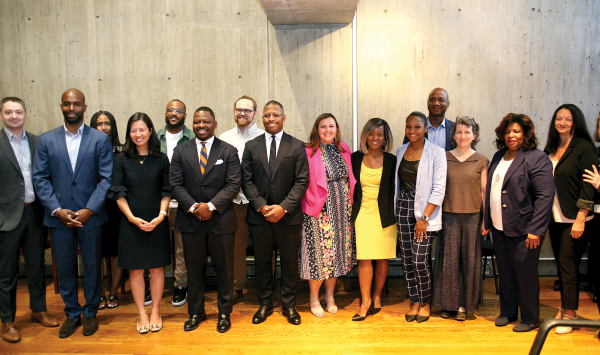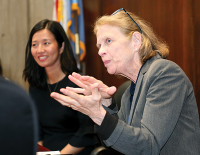June 26, 2024

Mayor Wu smiles for the camera with the entire group of Welcome Home Boston developers on hand for the June 12 meeting.

The vacant city-owned lots on the west side of Dorchester and into Mattapan that have sat vacant and underutilized for 35 or 40 years are getting fewer by the day. Just this month at a City Hall roundtable discussion, Mayor Wu and city Housing Chief Sheila Dillon announced a second round of the Welcome Home Program, whereby smaller developers, many of them people of color trying to break into the industry, have been allotted 15 vacant lots on which they would be expected to build much-needed affordable and workforce housing.
The announcement followed last October’s initial developer program of 12 vacant lots and many of those designees attended the City Hall meeting to share their excitement and experiences. The city’s goal is to have the first phase of this new effort under construction this year.
The new developers, officially designated in April by the Public Facilities Department, and their designated properties include:
•Ambry Development, Wales Street (one parcel).
•Boston Neighborhood Community Land Trust (BNCLT)/Co-Everything, Park Street (one parcel).
•Codman Square Neighborhood Development Corporation (CSNDC), Capen/Norfolk Streets (3 parcels).
•KNG Realty Corporation, Wildwood Street (one parcel).
•KZ Builders LLC, Nottingham Street (four parcels).
•Visionary Investors Building Equity (VIBE)/Mass Construction and Management Inc. (MCMI), Ballou/Selden Streets (five parcels).
“You all are literally building the community these homes that will shape our city for generations,” said the mayor, who noted that these are home ownership opportunities.
Said Dillon, “These teams will transform underutilized parcels into new affordable homes, as part of our ongoing efforts to provide more homeownership opportunities for Boston residents. The fact that some of these parcels have been in the city’s inventory for over 34 years underscores the importance of this initiative in revitalizing our communities and making Boston a more equitable and affordable place to live.”
The units will be available to families with incomes below 80 percent and 100 percent of the Area Median Income (AMI). Notably, the buildings will be fully electric multi-unit developments to meet the city’s environmental goals.
In the discussion, developers noted that the program allows them to get over hurdles that they couldn’t do alone.
Rev. Willie Bodrick III, and his brother Winston, of Ambry Development, were designated for one parcel on Wales Streets. Citing a “pre-development, pre-development” need, he said smaller developers often require help with capital.
“There are major costs long before you even get to pre-development and that’s a place the city can help us,” he said, noting that many developers end up having to invest their own money, which is hard when trying to balance a family.
Phil Cohen, with plans to build on Harvard Street in Dorchester in the initial phase, said it is a tight timeline.
“The city is very serious about expediting affordable housing; it’s not just talk,” he cautioned the incoming developers. “We tell them we’ll give them a two-month timeline and they’ll say they want one month. It’s makes for a very exciting process and it’s good for us and the city.”
Bodrick and others developing on Nottingham Street said that when they went out to meet with the community, few residents knew about the program or their designation. In general, all the developers said, the community process for the vacant lots has sometimes been challenging and suggested better communication to civic groups ahead of any designations.
“Abutters always seem so surprised,” said Bodrick, who also leads the historic Twelfth Baptist Church in Roxbury. “It seems there was already a seed of distrust sown in the process,” he said.
However, he also said the program is very positive because it seeks to keep people in their neighborhoods and prevent “cultural deterioration. It’s preventing a loss of stories and institutions, it’s reaffirming the cultural identity of our community and pushing back against the erasure.”
The Welcome Home Boston program was a highlight of the early days of the Wu administration and was picked up from the original efforts of former District 4 City Councillor (now state Attorney General) Andrea Campbell, who had all the vacant lots catalogued and prepared for distribution during her time in office.



